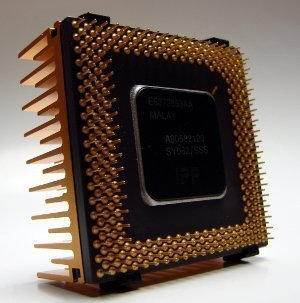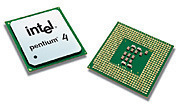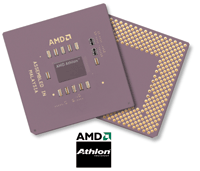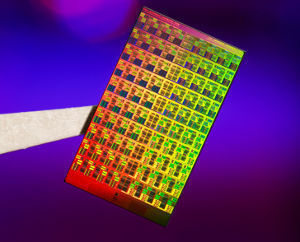A computer processor is commonly referred to as the CPU, or central processing unit of a computer. The processor is the primary component of a computer designed to move and process data. Computer processors are commonly referred to by the speed that the CPU can process computer instructions per second measured in hertz and are one of the primary selling points of a computer.
How Does the Processor Work?
The computer processor acts as the primary coordinating component of the computer. The CPU will access programs, data, or other computer functions from RAM (Random Access Memory) when called by the computer's operating system. The processor will then interpret the computer instructions that are related to the ordered task before sending it back to the computer's RAM for execution via the computer system bus in the correct order of execution.
Computer Processor Logic
At the core of the computer processor is the ability for it to process machine language code. There are three basic machine language instructions that the CPU can execute:
– Moving data from one location in the computer's memory to another
– Jump to new instruction sets based on logical operations or choices
– Perform mathematical operations using the Arithmetic Logic Unit (ALU)
In order to conduct these operations the processor makes use of an address bus that it uses to send addresses to the computer memory as well as a data bus that is used to retrieve or send information to the computer memory. It also has a separate control line that will notify the memory of the computer if it is getting or sending/setting a given memory location. In order to conduct all of its designed operations, the CPU also has a clock which forms the basis for synchronizing the processor's actions with the remainder of the computer. For accessing commonly used computer instructions or data, processors will also implement different caching schemes in order to gain access to the required data at a faster rate than using direct access RAM.
Processor Memory
The computer processor makes use of read only and random access memory (ROM and RAM respectfully). The processor's ROM is programmed with preset information that is permanently programmed with core functions in order to facility processor communication with the data bus. ROM is commonly referred to as the BIOS (Basic Input/Output System) on Windows computers and is also used to retrieve the boot sector for the computer.
The processor can read and write to the RAM depending on what action(s) the current instruction set has determined if the processor needs to conduct. RAM is not designed to permanently save data and is rest when the computer is turned off or loses power.
The Role of the 64 Bit Processor
Although 64 bit computer processors have been deployed since the early 1990s, they have only been deployed at the consumer-level in large numbers in recent years. All of the major computer processor manufacturers now produce 64 bit computer processors which are available for use across different types of operating system. The primary advantage of a 64 bit computer processor over legacy designs is the significantly expanded address space available to the processor. The previous 32 bit processors would be limited to a maximum of two to four gigabytes of effective RAM access. 64 Gigabyte processors are also able to provide increased input/output access to hard drives and the computer's video card that help to further increase overall system performance.
Early adopters of 64 bit processors don't necessarily see a large system performance if not doing high demand tasks such as video editing or playing networked 3D video games. This will continue to change as more applications are designed to take advantage of 64 bit processors and the increased memory capacity of the new computer processors.




Moxin
Out of sheer necessity I’m self thought when it comes to laptop repair. I’m no brainy’ack but I understand the function & how the hardware processes, retrieves, holds & dumps data, it’s like making hash “chop” “chop”, Now if I were to explain to a person how a CPU works who missed computer 101, I would explain this way.. A computing device is basically mores code machine at compressed quantum speed, The engine or what does most the heavy lifting Is The “CPU” or central processing unit, how it works seems to be the thing that is hard to put in terms that the average folk can grasp, after replacing more thermal product in more devices then I’ll ever remember, what I can tell is the processor or “REACTOR” hence the word “core” as in “the core of” uses sonic or radio energy, maybe thru a frequency generator to vibrate the crystal to open & close a circuit, mind you this is just from working on a ton of devices & looking at the thermal paste or grease on sinks or heat exchangers, you can see the dynamic exchange taking place as the crystal or CPU bulges under a load, (That’s strictly from observation & working on them, its probably wrong or half right, but it makes more scene than some high tech “theory” using nomenclature that can’t be found in dictionary for dummy’s) Anywho… “This is important” it is crucial to the life & performance of any computing device to replace the thermal products every 3 to 4 years, thermal “paste” “grease” “pads” & or “tape” provides continuity of heat from the top of the “CPU” or reactor to the sink or heat exchanger, when a crystal is vibrated at sonic speed, it exchanges sonic energy for inferred or “heat” as it slows down & past to the fan to kick out.. After a few years “T.P”. will dry up like concrete, heat is trapped & your fan will wind up screaming than “BLINK” the device turns off… as far as how much power you’ll need in a device? such as how many cores & or GHz CPU “THIS IS THE TRUTH!” all the power in the world is not going to fix bad behavior! if you don’t run a spyware program twice a month & a antivirus at least once a month, your going to limp around like a snail! I’ve had $5,000 systems in my shop just jammed packed with malicious or “malware” hammer carped! Oh! they needed all that $5,000 machine to go onto Facebook & check email… I can have any top shelf systems & I use an old IBM with a core 2 duo 4GB ram & 60 gig HD, it’s fast enough for me, most folks will never use 10% of there device potential, Well? If you like parasitic content or “malware” such as spyware, worms, Trojans, adware & viruses, on your system you’ll need all the power you can afford $$ BEST WISHES!